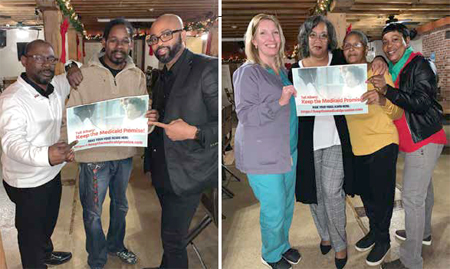Keep The Medicaid Promise
February 27, 2020
Members urge lawmakers to avoid drastic cuts to the vital healthcare program.

But in fact, Medicaid was created a little over half a century ago, when Lyndon Johnson shepherded the program through Congress as part of his ambitious Great Society program. At the time, the country was still reeling from John F. Kennedy’s assassination, and there was a steady wave of support for a more equitable society, built on the Kennedy Administration’s gains.
At the time, many Republicans and conservatives fiercely opposed Medicaid and its sister program for seniors, Medicare. Many in the party fought bitterly to cut them ever since. Today we see a continuation of those efforts with the Trump Administration’s massive tax cut for the wealthy and the removal of $1.5 trillion from the federal budget, providing an excuse to cut funding to programs like Medicaid.
States depend on Federal dollars for their Medicaid programs, which ensures that all families can get the health care they need to get healthy and stay healthy. It allows everyone to see a doctor when they are sick, get check-ups, buy medications, and go to the hospital.
This year, New York state officials announced a $2.5 billion gap in available state funding for Medicaid. That puts a big target on the back of safety net hospitals and other vital services.
In response, 1199ers are mobilized and urging elected official to reject damaging cuts to this vital lifeline for millions of New Yorkers. They can do so with new revenue from the wealthy and corporations and a focus on rooting out profiteering and excess administrative costs in the system.
In January, 1199ers went to Albany to lobby lawmakers to Keep the Medicaid Promise and avoid trying to balance the budget by threatening the health care of vulnerable people across the state.
Lauren Jarushewsky, an Occupational Therapy Assistant at the Orzac Center for Rehabilitation in Valley Stream, emphasized how the quality of care her patients receive would be affected.
“As therapists, we went into this field to help people meet their potential, but with cuts it’s very stressful to try to do that. Of course, we get the job done, because we’re dedicated professionals, but when patients are discharged early it’s stressful on them and stressful on their caregivers at home. They affect everyone.”
Danisha Marrero, who works as a Certified Alcohol and Substance Abuse Counselor (CASAC) in the Opium Addiction Program at Mt Sinai Beth Israel in New York City, says Medicaid cuts have a domino effect on vulnerable populations.
“For me, this isn’t just about the opiate crisis. When you talk about making these cuts you are talking about all kinds of treatments. Hospitals will have to turn people away. Those who need them won’t be able to access medications on which they depend. I can tell you cuts would hurt my patients in many ways. And that’s a significant number of people; about 85% of the people I see rely on Medicaid.”
Marrero says the answer does not lie in taking money out of the budget and that caregivers, who can be the voices of their patients, need to be brought into the conversation.
“We have a broken system and it has to be fixed. What am I supposed to say to a patient who has had their Medicaid cut and could die without treatment? We need to fix this problem at its root,” Marrero emphasizes.
“The fact that some of our elected officials even entertain making these kinds of dangerous cuts is really concerning.
It tells me they don’t understand what is really going on with our patients and in our communities.”
“When Medicare cuts went into effect last October, we lost 3 Occupational Therapists and 3 Physical Therapists,” adds Jarushewsky. “More Medicaid cuts will just cause even more to be taken away. We will have less time to spend with patients and must do more for our patients in less time. As professionals we still must give our patients the same level of care, but now we have to do in 30 minutes what used to take 60 minutes.”
- 1199 Magazine: January / February 2020

